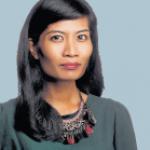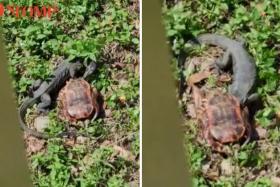Nibble as you forage in the forest
Learn unique skills such as food foraging under new programme by The Substation
Foraging for food in the wild might not seem like a common pastime among Singaporeans.
Unless you are an aspiring contender on reality TV show Survivor, of course.
But for amateur forager Esmonde Luo, learning about edible and inedible plants in the jungle is more than just a hobby.
It also helps him appreciate nature and do his part in preserving it.
This Saturday, the part-time tutor and nature enthusiast will be holding his second Foraging 101 outdoor workshop, where participants will be taught how to identify edible plants and other food options in the wild.
The class is among over 30 unique workshops run by the School Of Uncommon Knowledge as part of The Substation's first A Home For The Arts programme.


It is a parallel project to this year's Singapore Biennale art exhibition. Participants will walk on a trail along the Rail Corridor near the Bukit Timah Railway Station, a journey that lasts at least 45 minutes.
This Saturday's workshop is full, but interested parties can sign up to be placed on a wait list.
Last Tuesday, Mr Luo held an indoor workshop and demonstrated how edible plants can be incorporated into everyday cooking.
The 29-year-old, who developed a keen interest in foraging about five years ago, told The New Paper: "Singapore is a garden city, but most of the nature that we see is on TV or through car windows as we drive.
"I think it is useful to go out...and learn about the ecosystem. If we don't touch and feel for ourselves, we will never truly appreciate nature and learn to take care of it."
The free workshops operate on a barter system.
Mr Luo, who also dabbles in film and theatre, trades his knowledge for any of these three things: something he can plant, eat or drink, or cook.
When Mr Luo led this reporter on the trail, he shared interesting facts about plants such as lavender sorrel, ivy gourd and bananas.
SOUR
Once in a while, he would squat to get a closer look at a plant or gently brush aside vines overhead to find ripe fruits.
He munched on a lavender sorrel leaf - thumb-sized with round, neat edges - and spoke of its slightly sour taste.
"You can sprinkle the leaves over rice, like in nasi ulam (rice with herbs)," said Mr Luo, who grows plants such as galangal, turmeric and ivy gourd in his garden.
He was quick to warn against eating cocoyam leaves, which are big and spade-shaped, as they "prick" the throat when eaten raw.
Overeager foragers should also take note: Finding fruits that are suitable for eating is very rare.
"The chances of getting edible fruit, in reality, is close to nothing. All the other animals, birds and insects would have got to it first," he said.
He popped the lone ripe banana we saw on the trail into his mouth, then expelled its tiny seeds back into some shrubbery.
"You can't eat the seeds anyway, so you might as well give back to the earth so more plants can grow back," he said.
If we don't touch and feel for ourselves, we will never truly appreciate nature and learn to take care of it. Mr Esmonde Luo, a nature enthusiast and amateur forager
Make new clothes from old
Designing a good travel publication, creating a new outfit from old clothes and making a sex toy - these are just some of the things participants can learn at workshops, as part of Substation's A Home For The Arts programme.
It is the first time the arts centre is holding the programme.
The programme is divided into three components - School, Recreation and Therapy.
In its Therapy component, called Armenian Clinic, participants are prescribed "healing films" by film-makers for issues that range from "persistent cynicism" to a "declining quality of life".
The Recreation component allows participants to engage in different forms of play.
All the workshops under the School component - called School Of Uncommon Knowledge - run on barter or an exchange of services.
RELATIONSHIPS
Ms Ailin Chin, The Substation's programme manager for education and outreach, told The New Paper: "There is the whole debate about how teachers are service providers and students are customers. That transactional model of education is problematic so we wanted to shake things up.
"This is more relational, allows for relationships to be built and is the first step towards building a community."
The activities and workshops will run until the end of this month.
Go to www.ahomeforthearts.org for more information.
Get The New Paper on your phone with the free TNP app. Download from the Apple App Store or Google Play Store now



